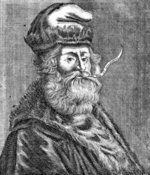Ramon Llull
|
|
Ramon Llull (1235 - June 29, 1315) (in Latin Raimundus or Raymundus Lullus) was a Catalan writer and philosopher born into a wealthy family in Palma, Majorca.
| Contents |
Early life
Llull was well educated, and became the tutor of James II of Aragon. He wrote in Arabic, Latin and Catalan. In 1265 he had a religious epiphany, and became a tertiary Franciscan. His first major work Art Abreujada d 'Atrobar Veritat (The Art of Finding Truth) was written in Catalan and then translated into Latin. He wrote treatises on alchemy and botany, Ars Magna, and Llibre de meravelles. He wrote the romantic novel Blanquerna, the first major work of literature written in Catalan, and perhaps the first European novel. Llull pressed for the study of Arabic and other then-insufficiently studied languages in Spain for the purpose of the conversion of Muslims to Christianity.
Ars generalis ultima
Around 1275, Llull designed a method, which he first published in full in his Ars generalis ultima or Ars magna (1305), of combining attributes selected from a number of lists. He also invented numerous 'machines' for the purpose, each of which consisted of two or more paper discs inscribed with alphabet letters that referred to the lists of attributes. The discs could be rotated individually to generate a large number of combinations of ideas.
The method was an early attempt to use logical means to produce knowledge. Llull hoped to show that Christian doctrines could be obtained artificially from a fixed set of preliminary ideas. For example, one of the tables listed the attributes of God: goodness, greatness, eternity, power, wisdom, will, virtue, truth and glory. Llull knew that all believers in the monotheistic religions - whether Jews, Muslims or Christians - would agree with these attributes, giving him a firm platform from which to argue.
The idea was developed further by Giordano Bruno in the 16th century, and by Gottfried Leibniz in the 17th century for investigations into the philosophy of science. Leibniz gave Llull's idea the name ars combinatoria, by which it is now often known. Some computer scientists have adopted Llull as a sort of founding father, claiming that his system of logic was the beginning of information science.
Llull was vocally opposed by the Grand Inquisitor of Aragon, Nicolas Eymeric. As a result, Pope Gregory XI banned some of his writings.
First mission
In 1285 Llull visited Rome and from there embarked on a mission to convert the 'infidels' of Tunis to Christianity. He was violently expelled from Tunis, in an incident which was magnified by some later historians into a stoning to death, and therefore a martyrdom. On his return, Llull began to preach for a unification of the three monotheistic faiths - Judaism, Christianity and Islam - which, together, he hoped, would be able to defeat the Asian invaders then threatening Europe and the Middle East.
Llull had always found his spirtual beliefs close to those of Francis of Assisi, and around 1295 he joined the Franciscan order.
In 1297 Llull met Duns Scotus, after which he was given the nickname Doctor Illuminatus.
Second mission
Llull travelled to Tunis a second time in about 1314, and wrote numerous letters to the king of Tunis, but little else is known about this part of his life.
Third mission
In the early 14th century Llull visited North Africa on a reconnaissance mission for the second crusade being planned by the Pope. He returned in 1308, reporting that the conquest should be achieved through prayer, not through military force. Llull died at home in Palma some years later.
Reputation after death
Posthumously, Llull became celebrated as a great alchemist, although he had been opposed to occult beliefs. At some time he was credited with having discovered ether, in about 1275, although there is no contemporary evidence for this. Another myth sprang up that Llull was martyred on one of his missions to Tunis.
Bibliography
Llull is known to have written at least 265 works, including:
- The Book of the Lover and the Beloved
- Blanquerna (a novel; 1283)
- Desconort (on the superiority of reason)
- Tree of Science (1295)
- Tractatus novus de astronomia
- Ars Magna (The Great Art) (1305) or Ars Generalis Ultima (The Ultimate General Art)
- Ars Brevis (The Short Art; an abbreviated version of the Ars Magna)
- Llibre de meravelles
- Practica compendiosa
- Liber de Lumine (The Book of Light)
- Ars Infusa (The Inspired Art)
- Book of Propositions
- Liber Chaos (The Book of Chaos)
- Book of the Seven Planets
- Liber Proverbiorum (Book of Proverbs)
- Book on the Seven Gifts of the Holy Spirit
- Ars electionis (on voting)
- Ars notatoria
- Introductoria Artis demonstrativae
- Book of the Gentile and the Three Wise Men
About another 400 works are doubtfully or spuriously attributed to him.
External links
- English translations of lullian works, freeware version of Ars Magna (http://lullianarts.net)
- Ramon Llull Database, University of Barcelona (http://orbita.bib.ub.es/ramon/p.asp)
- Theosophy Library Online (http://theosophy.org/tlodocs/teachers/RamonLull.htm)ca:Ramon Llull
de:Raimundus Lullus es:Ramón Llull fr:Raymond Lulle sk:Raimundus Lullus uk:Луллій Раймунд

